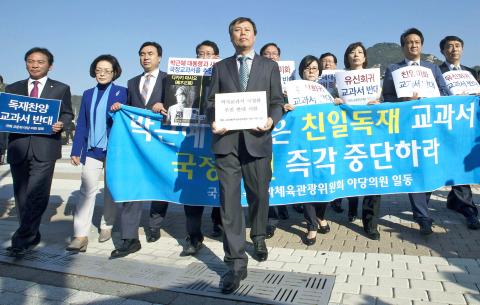Hundreds of South Korean academics have declared they are boycotting the writing of state-issued history textbooks out of concern that they will contain distorted views on the country’s recent history.
South Korean President Park Geun-hye’s government plans to require middle and high schools to use textbooks edited by the government after 2017, instead of allowing schools to choose from eight private publishers, as is currently the case.
South Korea’s move toward state-issued textbooks is the latest in a series of efforts by conservative leaders in Seoul and Tokyo to shape school history books to reflect their political views, and has sparked fierce criticism from academics and opposition parties.

Photo: EPA
Professors from more than 20 South Korean universities said they would not contribute to the textbooks because they believe the government is moving to soften descriptions of South Korea’s brutal dictatorships that preceded a bloody transition toward democracy in the 1980s.
The Korean History Research Association, the country’s largest group of historians with nearly 800 members, has declared it will not participate in the writing process.
Opposition leader Moon Jae-in, who lost the 2002 presidential election to Park, said in a Facebook post yesterday that the directive to revert to state-issued textbooks signals an attempt at “beautifying” past dictatorships, and added that such textbooks would be “global embarrassments.”
In announcing the controversial plans on Monday last week, South Korean Education Minister Hwang Woo-yea said that the current history textbooks are too left-leaning and encourage views sympathetic to North Korea and urged for the need of school books that were “objective” and “balanced.”
The plan was to recruit professional historians to help write the new textbooks.
Lee Shincheol, a historian at Seoul’s Sungkyunkwan University and a contributing author of one of the current textbooks, said that the government’s criticism makes little sense because private publishers had been required to follow editorial guidelines set by the South Korean Ministry of Education, Science and Technology and have their content reviewed by a state-run history institution.
For the government to insist on full control over textbooks would eliminate academic freedom and result in politicized historical narratives, Lee said.
“Even Korea’s feudal monarchs had granted autonomy to royal chroniclers, but Park’s concept of history is more outdated than that of old kings,” he said.
Park defended the move toward state-issued textbooks by saying history classes must inspire “pride” in students for being South Korean citizens.

Kehinde Sanni spends his days smoothing out dents and repainting scratched bumpers in a modest autobody shop in Lagos. He has never left Nigeria, yet he speaks glowingly of Burkina Faso military leader Ibrahim Traore. “Nigeria needs someone like Ibrahim Traore of Burkina Faso. He is doing well for his country,” Sanni said. His admiration is shaped by a steady stream of viral videos, memes and social media posts — many misleading or outright false — portraying Traore as a fearless reformer who defied Western powers and reclaimed his country’s dignity. The Burkinabe strongman swept into power following a coup in September 2022

‘FRAGMENTING’: British politics have for a long time been dominated by the Labor Party and the Tories, but polls suggest that Reform now poses a significant challenge Hard-right upstarts Reform UK snatched a parliamentary seat from British Prime Minister Keir Starmer’s Labor Party yesterday in local elections that dealt a blow to the UK’s two establishment parties. Reform, led by anti-immigrant firebrand Nigel Farage, won the by-election in Runcorn and Helsby in northwest England by just six votes, as it picked up gains in other localities, including one mayoralty. The group’s strong showing continues momentum it built up at last year’s general election and appears to confirm a trend that the UK is entering an era of multi-party politics. “For the movement, for the party it’s a very, very big

ENTERTAINMENT: Rio officials have a history of organizing massive concerts on Copacabana Beach, with Madonna’s show drawing about 1.6 million fans last year Lady Gaga on Saturday night gave a free concert in front of 2 million fans who poured onto Copacabana Beach in Rio de Janeiro for the biggest show of her career. “Tonight, we’re making history... Thank you for making history with me,” Lady Gaga told a screaming crowd. The Mother Monster, as she is known, started the show at about 10:10pm local time with her 2011 song Bloody Mary. Cries of joy rose from the tightly packed fans who sang and danced shoulder-to-shoulder on the vast stretch of sand. Concert organizers said 2.1 million people attended the show. Lady Gaga

SUPPORT: The Australian prime minister promised to back Kyiv against Russia’s invasion, saying: ‘That’s my government’s position. It was yesterday. It still is’ Left-leaning Australian Prime Minister Anthony Albanese yesterday basked in his landslide election win, promising a “disciplined, orderly” government to confront cost-of-living pain and tariff turmoil. People clapped as the 62-year-old and his fiancee, Jodie Haydon, who visited his old inner Sydney haunt, Cafe Italia, surrounded by a crowd of jostling photographers and journalists. Albanese’s Labor Party is on course to win at least 83 seats in the 150-member parliament, partial results showed. Opposition leader Peter Dutton’s conservative Liberal-National coalition had just 38 seats, and other parties 12. Another 17 seats were still in doubt. “We will be a disciplined, orderly